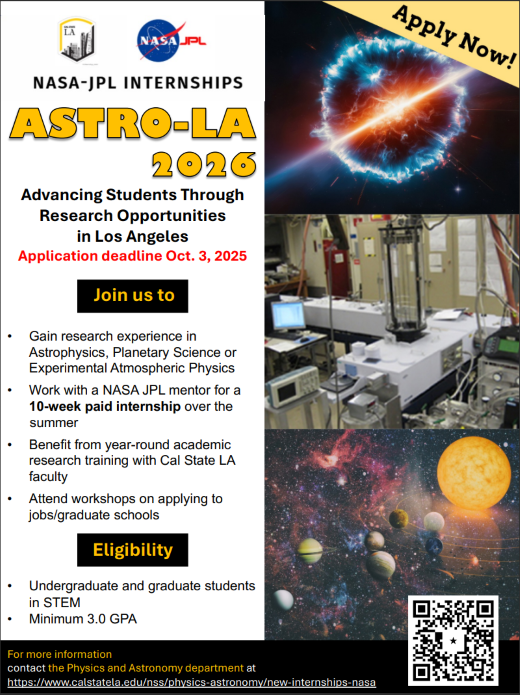Our department offers research opportunities for both undergraduate and graduate students in the fields of astrophysics/planetary science (Drs. Lazzarini, Royer, and Terebey), atmospheric and molecular physics (Dr. Le Bris), condensed matter physics (Drs. Bernal, Jishi, Rezayi, Rodriguez, Hays), robotics and instrumentation (Dr. Hays), gravitational waves and particle physics (Dr. Themann), and nuclear physics (Dr. Aniol).
Current Research Projects
The following is a non-exhaustive list of current openings in our department. Unless specified otherwise, these research projects are available to undergraduate and graduate students. Please contact the faculty members directly for more information.
Incoming projects include characterizing the population of X-ray emitting sources in nearby low-mass, low-metallicity galaxies using archival X-ray telescope observations, using time-domain optical surveys to characterize the variability of high mass X-ray binaries in Andromeda (M31), and constraining the formation channels of observed high mass X-ray binary systems by comparing with simulations. These observational research projects use multi-wavelength observations spanning from optical to hard X-ray wavelengths.
Learning outcomes: Students will become proficient in Python programming, UNIX/Linux operating system including installing and using command-line based software tools, scientific reading, writing and oral presentation.
|
Project Topics:
|
Laboratory Techniques:
|
People:
|
Faculty Contact: [email protected]
Project 1 – Synthesis and characterization of thin film alloys (thin-film evaporator and electrical resistivity measurements between 77 K < T < 300 K); metal-insulator transition in metallic oxides and bulk-metallic-glass forming alloys
Project 2 – Robotics and instruments to support NASA’s Artemis Moon program; autonomous robotics and instruments for NASA MINDS Program and other NASA missions to icy moons
Project 3 – Low temperature single-photon detectors for measurements in the infrared, X-ray, and gamma ray wavelength ranges for astrophysical research; properties of large-scale structure in the Universe
Project 1 – Climate impact of anthropogenic molecules
This project aims to provide qualitative information on the climate impact of new anthropogenic compounds released into the atmosphere. The students will perform data acquisition using Fourier transform spectroscopy to extract the climate metric of the targeted molecules.
Learning outcomes: The students will learn how to operate a research-grade Fourier transform spectrometer as well as gas handling and vacuum systems. Additionally, they will become proficient in data processing and analysis using Matlab.
Project 2 – Detection of pollutant by attenuated total reflection spectroscopy
The goal of this project is to detect the presence of per- and polyfluoroalkyl substances (PFASs), also known as "forever chemicals" in our environment using attenuated total reflection spectroscopy. Students will perform test on liquids and surfaces and test the limit of reliability of this technique.
Learning outcomes: The students will learn how to operate a research-grade Fourier transform spectrometer equipped with an ATR. Additionally, they will become proficient in data processing and analysis.
Project 1 – Magnetospheric interactions in the Saturn system
This project has for goal to study the interactions between Titan (the biggest satellite of Saturn), and its magnetic envelop (Saturn’s magnetosphere). Ultraviolet spectra from the Cassini spacecraft will be used to analyzed the response of Titan’s upper atmosphere to magnetospheric particle precipitation. The core of the project is to analyze 13+ years of Cassini data at Titan showing ultraviolet changing glowing patterns of Titan’s atmosphere according to Titan’s orbital position.
Learning outcomes: Students will learn about planetary atmospheres, become proficient at interpreting ultraviolet spectra, and develop computational skills using Python. Funding through a federal grant is available.
Project 2 – Waves in the upper atmosphere of Mars (Opening for a graduate student)
This project has for goal to study wave patterns detected in the upper atmosphere of Mars. The Mars Atmosphere and Volatile Evolution (MAVEN) spacecraft currently orbiting Mars revealed the presence of waves in the ultraviolet Nitric Oxide airglow emission in the upper atmosphere of Mars. This project has for objective to perform a harmonic analysis of the MAVEN ultraviolet data to uncover the nature and origin of the waves.
Learning outcomes: Students will learn about planetary atmospheres, become proficient at interpreting ultraviolet spectra, gain an understanding of wave theory, and develop computational skills using Python.
